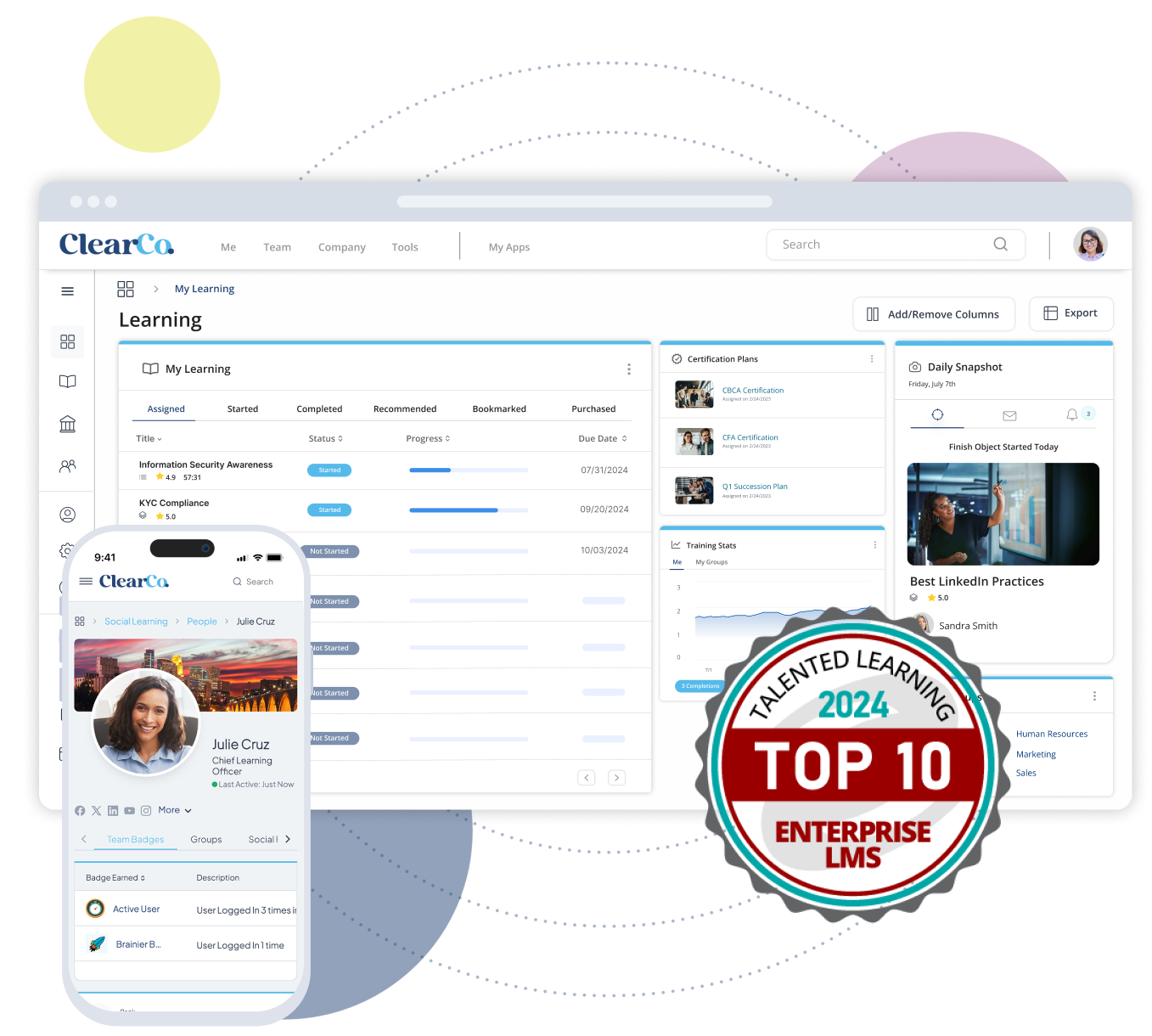Choosing a new learning management system (LMS) vendor can feel like you’re navigating a maze of features, pricing packages, and customer testimonials. Your team needs support for mandatory training courses, microlearning, and flexible career paths. The CHRO asked for software with analytics and reporting capabilities that make it easier to demonstrate learning and development (L&D)’s value. With so many options on the market, how do you decide which is the best LMS to support your company’s L&D initiatives?
The answer lies in the questions you ask. Preparing for your conversations will make it easier to determine both whether the LMS checks off your list of must-haves and if the vendor is the right strategic partner.
To make the best decision, you’ll need to dig deeper than demos and buzzwords. Ask the right questions to uncover software limitations, confirm the vendor’s commitment to user success, and ensure the LMS aligns with your needs today and future growth plans.
Let’s dig into how to prepare for your LMS search. Then, we’ll share some questions to ask during your demos to help you make the most informed decision.
Understanding Your LMS Needs
No matter the industry, the product or service it provides, or the number of employees on its payroll, every business has a use case for a learning management system. Whether employees need to complete regular compliance training or you want to boost engagement with an interactive learning program, an LMS does it all.
There are so many benefits of using an LMS platform because the software isn’t one-size-fits-all. They can be tailored to your specific training and development needs, designed to solve your unique challenges.
Here are a few examples of how an LMS is indispensable across workplace settings:
- Healthcare Organizations: An LMS ensures consistent, standardized training for procedures, policies, and patient care so every hospital, clinic, and lab maintains high-quality standards.
- Retail Stores: For chains of retail stores, a learning platform streamlines the onboarding process and delivers role-specific training for seasonal employees, getting them job-ready quickly and efficiently.
- Professional Services Companies: In accounting or law firms, an LMS supports leadership development programs, making it easier to identify high-potential employees, design clear career paths, and provide continuous coaching and learning opportunities.
To understand your LMS needs, consider what you want development and training programs to help the business achieve, e.g., microlearning courses for the sales team that contribute to revenue growth goals. Think about the L&D needs that are not currently being met, like training gaps or a lack of collaborative learning opportunities.
Other factors to consider include:
- Scalability: Can the software support my org’s long-term needs and growth?
- Compatibility: Does the LMS work with my talent management system?
- User experience: Is the software easy for employee learners to use, e.g., intuitive user interface, mobile online learning, and clear navigation?
- Customization: Can I create custom learning materials and career paths for certain roles or individuals?
- Data monitoring and insights: Can I track learner progress, assessment scores, course completion, and other KPIs to monitor L&D effectiveness?
Knowing your needs streamlines the process of finding the right LMS and lays the foundation for a strong learning culture.
10+ Questions To Ask LMS Vendors
Don’t rush the search to find a trusted LMS vendor — take your time to understand your needs and thoroughly vet your options. New business software is no small investment, so it’s crucial your vendor is a partner, not just a provider, that can grow with you and deliver maximum ROI.
Remember, this decision is as much about building a strong partnership with the vendor as it is about the features and functionality of the software itself. Asking the right questions will help you cut through the noise and focus on what matters most.
Bring these questions to your demos and evaluate LMS features on a level playing field.
1. How long is the typical software implementation timeline?
Can the LMS vendor get your training programs up and running in a couple of weeks, or will your L&D program require a few months of setup? Gain clarity on the rollout schedule by asking about typical implementation timelines. That helps you plan resource allocation and ensures a smooth transition without unexpected delays.
2. What types of learning content (video, SCORM, interactive modules, etc.) does your LMS support?
Ensure the LMS can handle a variety of training materials so you’re not limited in the ways you deliver content. A system that plays nicely with a wide range of formats means more engaging, flexible options for learners.
3. Does your platform offer customizable learning paths?
Personalized learning paths keep employees on track and motivated. Tailoring training to individual roles, skills, or goals makes the learning experience much more effective. When employees are invested in learning, they’re more likely to seek out and stick with L&D opportunities.
4. What interactive tools (quizzes, discussion forums, gamification) are available in the LMS?
Interactive features like quizzes and gamification boost engagement and help reinforce what employees learn, while discussion forums foster collaboration and peer-to-peer learning.
5. Can my employees access the LMS on their mobile devices?
With mobile access, employees can learn on the go, making it easier for them to stay engaged and complete courses at their own pace. They can complete microlearning courses, look back at learning resources, and finish assignments at the time and place that works for them.
6. Is the system scalable? How does it accommodate growing numbers of users and courses?
Growth shouldn’t mean outgrowing your business software. Choose an LMS that can grow with your organization so you don’t have to deal with the hassle and cost of migrating to a new platform down the line.
7. Is your LMS part of a complete talent management ecosystem?
When you choose software that’s part of a comprehensive talent management system, all of your employee data — from recruiting to training progress to performance reviews — flows together effortlessly. This streamlines workflows and gives you a holistic view of your workforce for the most in-depth insights.
8. What metrics are available in the system to track learner activities and course completion?
Data is key to making informed decisions. Look for an LMS that offers deep insights into learner progress that help you fine-tune your training and increase skill development.
9. Does the LMS leverage AI for content creation, course and content recommendations, coaching feedback, or other uses?
Ask about the system’s AI capabilities. AI automates routine tasks to tailor the learning experience to each user’s needs, ensuring content remains both relevant and engaging. This approach simplifies manual administrative tasks and helps improve training outcomes, keeping your team ahead and agile in the rapidly changing world of work.
10. Do you offer training or resources to help clients learn new features when they’re added to the platform?
When vendors offer support resources for new features or changes in functionality, your HR and L&D team can adapt quickly and get the most value out of the software as it evolves.
11. BONUS: What’s on your roadmap for future enhancements and feature updates?
This question helps you understand the vendor’s commitment to innovation and improvement. A roadmap signals that the vendor is actively investing in the future of the platform and staying ahead of industry trends. This helps you understand if the LMS is going to evolve in a way that fits your HR and L&D needs. You also get early visibility into what’s coming next so that you can prepare for changes in your processes or strategies.
Ultimately, a clear roadmap reassures you that you’re partnering with a forward-thinking vendor who’s capable of supporting your growth and adapting to future challenges.
Get L&D Results With the Right LMS Partner
Your LMS is an investment in your team’s potential and your business’s future. Keep your priorities at the forefront — and your list of questions handy — and you’ll find an LMS that offers the learning experiences employees want and empowers them to thrive.
Get even more questions to ask your LMS vendor. Download our list of 20+ questions and kick off your search with confidence.


